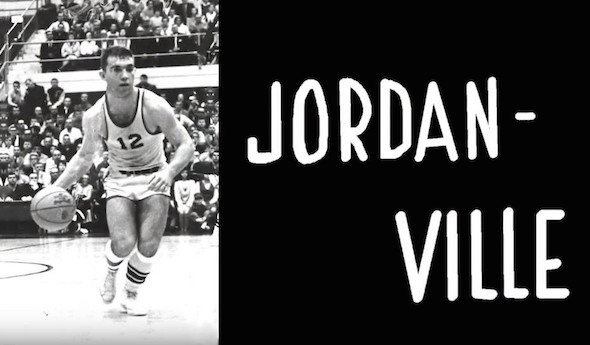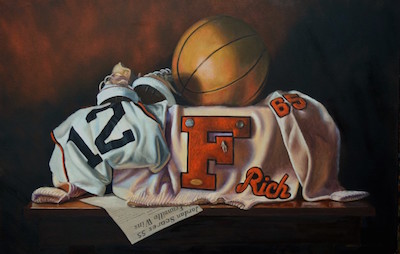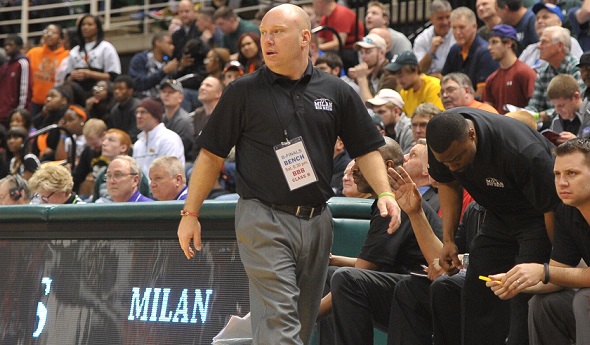
Film Fills In Picture of 'Fennville Flash'
By
Ron Pesch
MHSAA historian
December 28, 2017
We’ve been here before, but not in this way.
The last time was for a retrospective, covering one of the most impressive and awe-inspiring prep careers in Michigan high school history. That time was in print, and included a handful of still images that tried to illustrate the unbelievable.
But this time, the story is in documentary form. It’s woven together from grainy, scratched, faded silent film, a format of capturing memories familiar to thousands of people from generations past, as well as a series of modern-day high-resolution interviews.
Here, the basketball life of the athlete known as the “Fennville Flash” delivers on many levels. Yes, there is a Richie Jordan.
JordanVille, a documentary by John Mooy & Anne Colton, recalls a time when legend spread via word of mouth, newsprint and AM radio.
While it’s hard to comprehend for many today, the exploits of our athletic heroes were formed by “poets in the press box” who sat with pencil and paper, a typewriter, a microphone or a telephone, and described to their audience what they witnessed. On the receiving end, readers and listeners conjured up visualizations based on the facts, phrases and superlatives designed to create an image.
“Traveling left to right on your radio dial” helped listeners feel they were a member of the crowd, seated in the stands, in on the action and a witness to the mayhem. “Packed to the rafters,” reminded fans the importance of what was happening. An exciting game, presented by those with skill, created an event you longed to see. If a broadcast couldn’t be picked up on a transistor or tube radio, the final result might not be known, at the earliest, until the following day’s newspaper arrived.
I’ve told Jordan’s story via the MHSAA before; how he latched on to athletic training, weights and repetition to mold himself into a well-rounded athlete, able to leap to heights unexpected for a kid with a 5-foot-7 frame. The tales of his unfathomable accomplishments slowly leaked beyond the city limits of Fennville into Kalamazoo and greater Southwestern Michigan, then to Detroit. When Detroit Free Press writer Hal Schram relayed Jordan’s feats, the secret traveled across the state and beyond its drawn borders.
From there the legend of Jordan’s accomplishments grew. In Fennville, as in many small towns across the country, the city shut down when a game was played. The Jordan story was so enticing that thousands would travel vast distances to see him play with their own eyes. Today, his single season scoring average of 44.4 points per game during the 1964-65 campaign still remains the top mark in the MHSAA record book.
 JordanVille runs just shy of a half hour. Contained within is insight into the athlete that is challenging to relay in print form. Thanks to access to home movies and a series of interviews with Jordan, former teammates, past opponents and his high school coach, the determination, dedication and drive of a kid who wouldn’t let physical size be a deterrent from achievement radiates from the screen. On display is small town America at its finest, and perspective formed over 50+ years.
JordanVille runs just shy of a half hour. Contained within is insight into the athlete that is challenging to relay in print form. Thanks to access to home movies and a series of interviews with Jordan, former teammates, past opponents and his high school coach, the determination, dedication and drive of a kid who wouldn’t let physical size be a deterrent from achievement radiates from the screen. On display is small town America at its finest, and perspective formed over 50+ years.
For Mooy, it completes a filmmaking journey started six years ago. But the story of Jordan, in his eyes, date back to his school days. Mooy first heard about Jordan as a 7th-grader from a math teacher. A second-team all-St. Joseph Valley League selection, Mooy played at Marcellus High School and scrimmaged against Jordan and the Fennville Blackhawks.
He couldn’t believe his eyes.
“Everyone wanted to see this kid play,” said Mooy in 2011. “He was the first high school player I saw sign an autograph.
Today, with the interviews complete, and the film ready for viewing, Mooy sees more than just a sports story:
“With the benefit of years now passed, I look at the Rich Jordan story with a new respect. JordanVille created a place that was welcoming no matter who you were, or what color your skin happened to be. It was the 1960s. Rich was growing up Jewish, the Civil Rights Movement was in full swing, and the Vietnam War was on everyone's mind. And in Fennville, Michigan, from 1961 to 1965, the Jordan high school years, there were lessons beyond sports being learned by everyone that would last a lifetime. The Jordan household, under the guidance of (his parents) Tuffy and Sylvia Jordan, is where the story begins."
The film speaks of a time that has departed. Competition for our attention was less focused; phones hung on walls or sat on tabletops, communities were tighter, the training table featured peanut butter and chocolate milk instead of protein powder. A city could easily be renamed for a day.
The film also reminds us that those days were far from perfect.
If all goes as planned, the public will see the finished product come the flip of the calendar. In West Michigan, JordanVille is scheduled to show on New Year’s Day at 6 p.m. on WGVU, and will repeat on WGVU-Life at 7:30 p.m., Friday, Jan. 5.
Seek it out, and spread the word, just like in days of old.
 Ron Pesch has taken an active role in researching the history of MHSAA events since 1985 and began writing for MHSAA Finals programs in 1986, adding additional features and "flashbacks" in 1992. He inherited the title of MHSAA historian from the late Dick Kishpaugh following the 1993-94 school year, and resides in Muskegon. Contact him at [email protected] with ideas for historical articles.
Ron Pesch has taken an active role in researching the history of MHSAA events since 1985 and began writing for MHSAA Finals programs in 1986, adding additional features and "flashbacks" in 1992. He inherited the title of MHSAA historian from the late Dick Kishpaugh following the 1993-94 school year, and resides in Muskegon. Contact him at [email protected] with ideas for historical articles.
PHOTOS: (Top) Richie Jordan runs Fennville's offense during his thrilling high school career in the 1960s. (Middle) Jordan memorabilia, as captured by Bill Williams.

Chelsea Coach Back 'To See This Through'
October 26, 2018
By Doug Donnelly
Special for Second Half
CHELSEA – Is anyone more excited about the start of prep basketball season than Josh Tropea?
With the calendar turning to November soon, we are only days away from the first boys basketball practice of the 2018-19 season. One of the biggest hardwood stories in southeast Michigan is that Tropea is back at Chelsea High School for his second stint as the head varsity coach there.
 He wasn’t gone long – he stepped away for just two years to coach at Spring Arbor University – but Tropea has brought his high energy and passion for basketball, and his whole family, back to the high school ranks.
He wasn’t gone long – he stepped away for just two years to coach at Spring Arbor University – but Tropea has brought his high energy and passion for basketball, and his whole family, back to the high school ranks.
“I’m thrilled to be back,” Tropea said. “I love being in a packed gymnasium on a Friday night. I’m so looking forward to battles with Dexter and playing Ypsilanti and going on the road for games. I love it.”
Tropea said he stepped away from the college job for several reasons – including the time he was spending away from his family on the weekends and because the timing was right to come back. Mark Moundros resigned after two years when he moved from the area. Tropea said he wanted to ensure the program continued its upward path.
“I have two sons at Chelsea,” he said. “If Mark had stayed I would not be here. But, when Mark left, and they didn’t have a viable candidate at the time, I felt like I didn’t want to let my two years here, the two years I had invested before leaving, to fall apart. Mark did a great job. I’d love it if he stayed, but I felt like I owed it to the kids to come back and see this through.”
The college experience has changed his approach to the game.
“I loved my college experience – loved it. Absolutely no regrets,” Tropea said. “But, I tell you, they have a much better version of me now. My temperament is better. I think I see the bigger picture better. Spring Arbor is all about being the best person you can be. I think I’m better now, not just in the Xs and Os, but as a person, as a coach.”
Tropea was already pretty good.
A South Lyon native, he’s been a basketball junkie for years. He got his first high school coaching job at Walled Lake Western while still in college. He made stops at Whitmore Lake and Howell while looking for a permanent teaching job, then landed at Milan in what turned out to be a made-for-each-other job. In short time, he rejuvenated the Milan Big Reds program from two wins the season before he took over the varsity to a surprise run to the Class B championship in 2013-14.
It wasn’t so much of a surprise that the Big Reds won the title that season, but how quickly Tropea built them into a powerhouse. During the summer before the title run, Tropea had his troops playing games all over the state, lining up scrimmages and playing in shootouts and tournaments that exposed the Milan players to some of the other elite.
“We had a lot of kids come from struggling homes or from tough situations,” Tropea said of his time at Milan. “Those kids were not entitled kids. As a family, we were able to make an impact in so many ways. Team dinners were a big deal. That’s what made leaving Milan so hard.
“It was maybe the best five years of my life for my wife and I,” he added. “It was such an exciting time, and we were just so embraced by the community.”
During his time there, the Big Reds went 92-27 and won three Huron League titles. The Class B title run was led by future college players Nick Perkins and Latin Davis. The Big Reds’ state championship was the first in boys basketball in the Monroe County Region in more than 60 years.
Tropea left Milan, he said, because of the teaching and coaching opportunity in Chelsea. Frankly, he said, the job paid more, and, for a young family, that was a big deal.
“It was a very difficult decision, but it was right for my family,” he said. “I was on a pay freeze for five straight years at Milan. Plus, we loved the Chelsea community. My wife wanted to come here.”
Although he was there just two seasons, Chelsea’s basketball program also came a long way in a short time.
The Bulldogs improved from 3-18 the year before he was there to 9-13 in 2014-15 and 16-6 in 2015-16, tying for second place in the Southeastern Conference White his second season. More importantly, Tropea laid the groundwork for the future. He started by getting into the lower levels of the school and teaching basketball to the younger students – and trying to let his passion for the game pass on to them.
“It’s rolling now,” he said. “The first year I had a summer camp, we had 17 kids. This past summer, we had 121. Everybody knows you have to have a youth program.
“We won 16 games my last year here, we won a District title two years ago and the team went 12-8 last year,” he said. “The program is in great shape.”
Tropea never has been afraid to adapt his game or the way he interacts with his players. He draws on his experiences working with other coaches every chance he gets.
“The game is constantly changing, and so are the kids,” he said. “You have to. You have to change.”
In today’s world that means using social media, such as Twitter, to set the tone of the program.
The @ChelseaBoysHoop Twitter feed, for example, regularly includes messages about workouts, inspirational quotes from some of game’s great players and encouragement to other Bulldogs athletes.
Great turnout at the meeting this morning! #BringtheJuice #GreaterThan #WePlayForMarch pic.twitter.com/ePCMjmAJdU
— ChelseaBoysHoop (@ChelseaBoysHoop) October 23, 2018
“I feel it can be a great tool if it is done right and positive,” he said of Twitter.
His wife, Alicia, is an integral part of the program, as are his children, Luke and Zack.
“This is definitely a family deal,” he said. “We are all in. I know no matter what, my wife will be in the third row and she’s so supportive. She’s all-in all the time. She supports me and my passion. You have to have that.”
Years from now, he said he might get back into the college game. But for now, being back at the high school level fits more his love of teaching the game.
“I’m a teacher at heart,” he said. “I love teaching the game. I love the four-player workouts and teaching the kids footwork and the importance of passing the ball with the seam. That’s what it’s all about – making an impact on the kids’ lives.”
The SEC can be a brutally tough league, and this year it’s only going to be stronger with the addition of Jackson to the division. With boys basketball season starting a week earlier this year and Chelsea’s football team alive in the MHSAA Playoffs, Tropea is employing somewhat of a different strategy than normal. The emphasis on the season, he said, will be to get his team ready for the Class B tournament come late February. He doesn’t want the players to peak too soon.
“We have one game before December 15,” he said. “We back-loaded the heck out of our schedule. I don’t care how good we are in November and December. I want to be playing our best basketball in March. We’re playing for March.”
Chelsea will have seven or eight seniors and five or six juniors on this year’s squad, Tropea said. Many of those seniors were part of a group that went 20-0 as freshmen and won 16 games as sophomores.
“We have some experience, and not just athletes but basketball players,” he said. “They are leaders. I’m so excited for this season. I’m happy to be back.”
 Doug Donnelly has served as a sports and news reporter and city editor over 25 years, writing for the Daily Chief-Union in Upper Sandusky, Ohio from 1992-1995, the Monroe Evening News from 1995-2012 and the Adrian Daily Telegram since 2013. He's also written a book on high school basketball in Monroe County and compiles record books for various schools in southeast Michigan. E-mail him at [email protected] with story ideas for Jackson, Washtenaw, Hillsdale, Lenawee and Monroe counties.
Doug Donnelly has served as a sports and news reporter and city editor over 25 years, writing for the Daily Chief-Union in Upper Sandusky, Ohio from 1992-1995, the Monroe Evening News from 1995-2012 and the Adrian Daily Telegram since 2013. He's also written a book on high school basketball in Monroe County and compiles record books for various schools in southeast Michigan. E-mail him at [email protected] with story ideas for Jackson, Washtenaw, Hillsdale, Lenawee and Monroe counties.
PHOTO: Returning Chelsea boys basketball coach leads his Milan team to the Class B championship in 2014 at Breslin Center.

